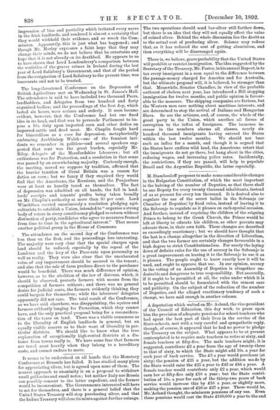The long-threatened Conference on the Depression of British Agriculture met
on Wednesday in St. James's Hall. The attendance is said to have included two thousand Peers, landholders, and delegates from two hundred and forty organised bodies ; and the proceedings of the first day, which lasted six hours, wei e serious and orderly. It soon became evident, however, that the Conference had but one fixed idea in its head, and that was to persuade Parliament to im- pose a 103. duty upon imported corn and other duties on imported cattle and dead meat. Mr. Chaplin fought hard for bimetallism as a cure for depression, metaphorically embracing Archbishop Walsh—one of the funniest inci• dents we remember in politics—and several speakers sug- gested that rent was the great burden, especially Mr. Riley, delegate of the Herefordshire labourers ; but all enthusiasm was for Protection, and a resolution in that sense was passed by an overwhelming majority. Curiously enough, the meeting, moved we suppose by tradition, affirmed that the heavier taxation of Great Britain was a reason for duties on corn ; but we fancy if they enquired they would find that the Americans, the Russians, and the Pnnjaubees were at least as heavily taxed as themselves. The fact of depression was admitted on all hands, the fall in land- lords' receipts and tenants' profits being taken broadly on Mr. Chaplin's authority at more than 30 per cent. Lord Winchilsea carried unanimously a resolution pledging agri- culturists to establish a Union, intended to " organise a strong body of voters in every constituency pledged to return without distinction of party, candidates who agree to measures framed from time to time in the agricultural interest." That means another political group in the House of Commons.






































 Previous page
Previous page